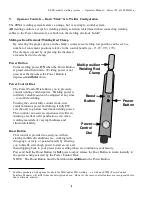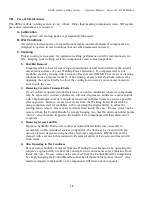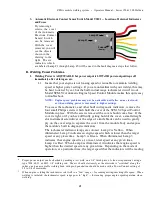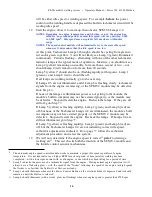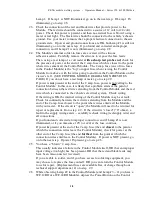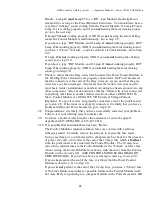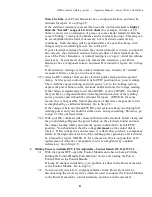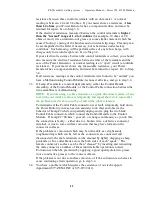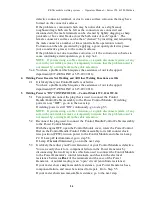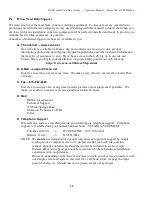
ZENA mobile welding system -- Operators Manual -- Series 150 & 200 Welders
22
22
resistance between these control terminals with an ohm meter. A normal
reading is between 1.4 and 2.4 ohms. If your meter shows a resistance of
less
than 1.4 ohms
, your Power Generator has a component failure, and must be
returned for repair. Go to Step 3.4.
If the electrical resistance measured between the control terminals is
higher
than the “normal” range of 1.4 to 2.4 ohms
(for example, 10 ohms or 20
ohms or more) it is an indication of grease or some similar material which has
caused “fouling” coating of the brushes and or internal slip-rings. Cleaning can
be accomplished in the field, if necessary, but is best done under factory
conditions. Such cleaning, will be performed free of any labor charge, with
charges only for return freight cost. Go to Step 3.4.
If your electrical resistance between the control terminals is correct, you should
also measure the electrical resistance between either of the terminals and the
case of the Power Generator. A normal reading is an “open” circuit (an infinite
resistance). If your meter shows any measurable resistance, your Power
Generator has a component failure, and must be returned for repair. Go to Step
3.4.
If all resistance readings at the control terminals were found to be “normal” you
have a Malfunctioning Control Module, reconnect all wires, and go to step 3.4.
3.3
If Lamp #2 maintain a constant light intensity, either the Control Handle
Assembly, or the Control Module, or the Control Cable connection between the
two assemblies is malfunctioning.
NOTE: If you are using a cable extension, or a quick disconnect system, of any
sort, with your welder, remove it temporarily and repeat the tests to insure that
the problem noted is not caused by a fault in the cable extension.
To determine if the Control Cable connection is at fault, temporarily hold down
the Power Button (you may need an assistant to do this) and observe the
behavior of Lamp #2 while you partially unplug and re-plug the two black
Control Cable connectors which connect the Control Handle to the Control
Module. If Lamp #2 “flickers”, goes off, or changes in intensity as you do this,
the connection is faulty -- either due to a broken wire, a defective connector
terminal, or due to some surface corrosion that may have formed on the
connector surfaces.
If the problem is corrosion (which may be noticeable as a slight sandy
roughness/drag which can be felt as the connectors are connected and
disconnected), the male terminals can be cleaned by lightly dragging a sharp
pen knife or box cutter blade across the both sides of each “spade”. The
female connector’s surface can be then “cleaned” by inserting and reinserting
the male connector a number of times (until reliable operation is noted).
Corrosion can then be prevented by applying a good quality dielectric grease
(not a conductive grease) to the contact surfaces.
If the problem is not due to surface corrosion, or if the corrosion is so bad as to
cause continuing erratic operation, go to step 3.4.
3.4
You have a problem which requires the assistance of our tech support
department (877-ZENA INC or 615-897-2011).

